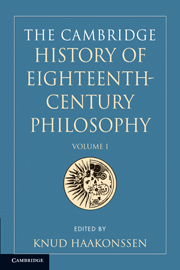Book contents
- Frontmatter
- CONTENTS
- Preface
- Methods of reference and abbreviations
- List of contributors
- I The Concept of Eighteenth-Century Philosophy
- 1 The History of Eighteenth-Century Philosophy: History or Philosophy?
- 2 Concepts of Philosophy
- 3 Schools and Movements
- 4 The Institutionalisation of Philosophy in Continental Europe
- 5 The Curriculum in Britain, Ireland, and the Colonies
- 6 Informal Networks
- II The Science of Human Nature
- Biobibliographical Appendix
- Bibliography
- References
4 - The Institutionalisation of Philosophy in Continental Europe
from I - The Concept of Eighteenth-Century Philosophy
Published online by Cambridge University Press: 28 March 2008
- Frontmatter
- CONTENTS
- Preface
- Methods of reference and abbreviations
- List of contributors
- I The Concept of Eighteenth-Century Philosophy
- 1 The History of Eighteenth-Century Philosophy: History or Philosophy?
- 2 Concepts of Philosophy
- 3 Schools and Movements
- 4 The Institutionalisation of Philosophy in Continental Europe
- 5 The Curriculum in Britain, Ireland, and the Colonies
- 6 Informal Networks
- II The Science of Human Nature
- Biobibliographical Appendix
- Bibliography
- References
Summary
INTRODUCTION
Although the historiography of this subject is large, it is also remorselessly particularist in focus, rarely venturing beyond the study of individual institutions to discern broader national or European trends and developments. Any overview must therefore begin with a few cautionary and defensive words defining the limits to be placed on the meaning of institutionalised philosophy during this period. Next we shall consider some generalisations that are relevant to the teaching of philosophy across all the many and varied European institutions of learning where it was officially taught. Then we shall examine separately the phenomenon of the learned academy as it matured in this era. Finally, some brief but more detailed remarks will be offered on developments in France and Germany. These countries are chosen partly for their intellectual and geopolitical dominance but also because they illustrate respectively the two contrasting patterns of change that philosophy experienced as a discipline. In France, philosophy is subdivided and taught as a series of new specialisms whereas in Germany, its remit is substantially extended from an introductory to the foundational role. This division is symbolised at the end of the period by the respective dominance of two differing concepts of institutionalised philosophy that in France owed much to Condillac and in Germany to Kant.
The most obvious difficulty we have is how broadly to interpret the category of philosophy itself: a minimalist approach would restrict coverage to those courses at universities and colleges that are explicitly designated as philosophical according to the eighteenth century’s own subdivision of the subject, but at the other end of the spectrum it may equally be argued that this investigation should comprehend those subdivisions of the discipline that are recognised today irrespective of the faculty or course where they were taught and located in the eighteenth century.
- Type
- Chapter
- Information
- The Cambridge History of Eighteenth-Century Philosophy , pp. 69 - 96Publisher: Cambridge University PressPrint publication year: 2006



